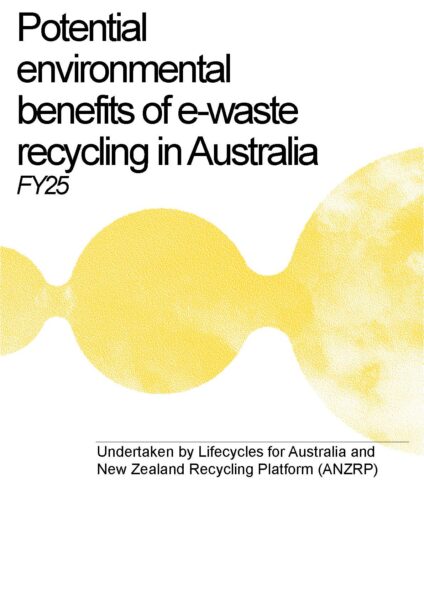PRODUCT STEWARDSHIP
As a key advocate in the product stewardship sector, ANZRP creates awareness of the importance of managing a product’s environmental impact throughout all stages of its life cycle, including end of life. Product stewardship is an environmental management strategy that means whoever designs, produces, sells, or uses a product takes a share of responsibility for minimising its environmental impact.

WE SHOULD ALL BE PRODUCT STEWARDS
ANZRP works closely with other sustainability organisations such as Planet Ark and other product stewardship programs such as Mobile Muster and Cartridges 4 Planet Ark to raise public and business awareness of the importance of recycling.
E-WASTE — THE FASTEST GROWING WASTE STREAM IN THE WORLD
In Australia, e-waste is growing three times faster than any other type of waste. So what happens to our end-of-life computers and TVs? We don’t want them ending up in landfill where we will lose the valuable resources, such as copper, steel and aluminium that they contain or where they can negatively impact our environment.
Part of ANZRP’s vision is to create a community which collects, processes and safely recycles e-waste for responsible environmental outcomes. We do this by offering a free and simple way for Australians to safely recycle their e-waste, via our TechCollect e-waste recycling service. Find out where your nearest TechCollect site is to drop off your unwanted e-waste here.
We only partner with recyclers who operate to the highest Australian environmental and work, health and safety standards. We ensure a high recovery rate of the materials recycled.
We consistently represent our members in product stewardship advocacy, and are advocating for the expansion of products in scope under the NTCRS, which currently requires TVs, printers, computers and accessories to be recycled. You can view our White Paper here.
ANZRP ANNUAL REPORTS
To find out more about our recent activities, download our Annual Reports below.
ANZRP Life Cycle Assessment Reports
ANZRP has engaged Lifecycles to calculate the environmental benefits of its operations for its annual report since FY2016. The report below presents the updated environmental data for FY2025, covering the benefits of e-waste recycling on climate change, water and energy use and particulate emissions.
The analysis aims to answer the following two questions:
- What are the environmental impacts associated with the collection and recycling of e-waste collected through ANZRP’s TechCollect program?
- What environmental benefits can be derived from the recovery of secondary materials in this system?
What is a Life Cycle Assessment (LCA)?
A Life Cycle Assessment (LCA), is a methodology that can be used to evaluate the environmental impact of a product or service or process through its entire life cycle. This typically includes looking at activities such as the extraction of raw materials to manufacturing, transportation, usage and disposal of a product. LCA aims to include all important environmental impacts for the product system being studied. In doing so, LCA seeks to avoid shifting impacts from one life cycle stage to another or from one environmental impact to another. LCAs can therefore provide a comprehensive understanding of where the environmental impacts are and how businesses can use this evidence and knowledge to improve their sustainability performance.
The framework and principles of LCA are described in the international standard ISO 14040 [1]. The specific requirements for LCA are defined by ISO 14044 [2]

GOVERNMENT FACT SHEETS
The following Fact Sheets have been developed by the Department of Climate Change, Energy, the Environment and Water (DCCEEW) to assist in better understanding the Recycling and Waste Reduction (Product Stewardship – Televisions and Computers) Rules 2021 and the National Television and Computer Recycling Scheme (NTCRS).
- Overview of the National Television and Computer Recycling Scheme
- National Television and Computer Recycling Scheme – Guide for Local Government
- The role of recyclers in the National Television and Computer Recycling Scheme
- National Television and Computer Recycling Scheme – a guide for householders
- National Television and Computer Recycling Scheme: Co-regulatory Arrangements
RESOURCES
- ANZRP White Paper NTCRS Scope Expansion 2020
- ANZRP response to Act and NTCRS Consultation Paper June 2018
- ANZRP response to VIC e-waste landfill ban January 2018
- ANZRP White Paper 2017 – Review of the Product Stewardship Act 2011 and NTCRS
- Operational Review of the National Television and Computer Recycling Scheme
- Global e-waste systems: Insights for Australia from other developed countries – A report for ANZRP by the Economist Intelligence Unit